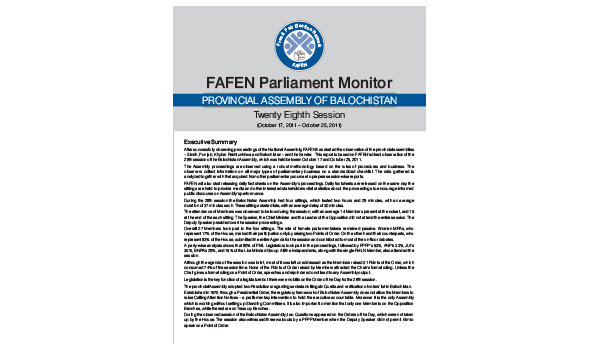 After successfully observing proceedings of the National Assembly, FAFEN has started the observation of the provincial assemblies – Sindh, Punjab, Khyber Pakhtunkhwa and Balochistan – and the Senate. This report is based on FAFEN’s direct observation of the 28th session of the Balochistan Assembly, which was held between October 17 and October 25, 2011.
After successfully observing proceedings of the National Assembly, FAFEN has started the observation of the provincial assemblies – Sindh, Punjab, Khyber Pakhtunkhwa and Balochistan – and the Senate. This report is based on FAFEN’s direct observation of the 28th session of the Balochistan Assembly, which was held between October 17 and October 25, 2011.
The Assembly proceedings are observed using a robust methodology based on the rules of procedures and business. The observers collect information on all major types of parliamentary business on a standardized checklist. The data gathered is analyzed together with that acquired from other parliamentary sources to prepare session-wise reports.
FAFEN will also start releasing daily factsheets on the Assembly’s proceedings. Daily factsheets are released on the same day the sittings are held to provide media and other interested stakeholders vital statistics about the proceedings to encourage informed public discourse on Assembly’s performance.
During the 28th session the Balochistan Assembly had four sittings, which lasted two hours and 29 minutes, with an average duration of 37 minutes each. These sittings started late, with an average delay of 30 minutes.
The attendance of Members was observed to be low during the session, with an average 14 Members present at the outset, and 15 at the end of the each sitting. The Speaker, the Chief Minister and the Leader of the Opposition did not attend the entire session. The Deputy Speaker presided over the session proceedings.
Overall 27 Members took part in the four sittings. The role of female parliamentarians remained passive. Women MPAs, who represent 17% of the House, marked their participation only by raising two Points of Order. On the other hand their counterparts, who represent 83% of the House, submitted the entire Agenda for the session and contributed to most of the on-floor debates.
A party-wise analysis shows that 80% of PML Legislators took part in the proceedings, followed by PPPP’s 53%, ANP’s 33%, JUI’s 30%, BNPA’s 29%, and 15% of the Like Minded Group. All the Independents, along with the single PMLN Member, also attended the session.
Although the agenda of the session was brief, most of it was left unaddressed as the Members raised 31 Points of the Order, which consumed 74% of the session time. None of the Points of Order raised by Members attracted the Chair’s formal ruling. Unless the Chair gives a formal ruling on a Point of Order, speeches and rejoinders do not lead to any Assembly output.
Legislation is the key function of a legislature but there were no bills on the Order of the Day for the 28th session.
The provincial Assembly adopted two Resolutions regarding sectarian killings in Quetta and verification of voters’ list in Balochistan. Established in 1970 through a Presidential Order, the regulatory framework of Balochistan Assembly does not allow the Members to raise Calling Attention Notices – a parliamentary intervention to hold the executive accountable. Moreover it is the only Assembly which is working without setting up Standing Committees. It is also important to mention that only one Member is on the Opposition Benches, while the rest are on Treasury Benches.
During the observed session of the Balochistan Assembly, two Questions appeared on the Orders of the Day, which were not taken up by the House. The session also witnessed three walkouts by a PPPP Member when the Deputy Speaker did not permit him to speak on a Point of Order.
FAFEN hopes this report will be a valuable contribution to creating a more informed citizenry and an increasingly responsible Parliament.
For complete report, please click here








